|
|
|
Sort Order |
|
|
|
Items / Page
|
|
|
|
|
|
|
| Srl | Item |
| 1 |
ID:
127642
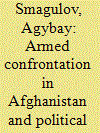

|
|
|
|
|
| Publication |
2013.
|
| Summary/Abstract |
The author looks at how the armed confrontation in Afghanistan affects the political and economic situation in Central Asia.
First, Afghanistan, which became a seat of international terrorism and religious extremism, as well as a foothold of the armed Tajik and Uzbek opposition in the 1990s, has developed into the real threat of a violent regime change in Tajikistan and Uzbekistan. In Tajikistan, the U.N. and certain other regional countries acting as intermediaries have successfully integrated the opposition into the country's peaceful development. The Uzbek opposition fighting on the side of the Taliban has been considerably weakened by the international counterterrorist coalition.
A compromise was reached in Tajikistan through constitutional amendments that legalized the Islamic party; on the other hand, we cannot rule out the possibility that in a country with a predominant Muslim population, Islam, a legal political factor, might come to power through democratic elections (this has already happened in Egypt).
The leaders of Uzbekistan chose a different road: instead of negotiations and compromises, they squeezed the armed opposition out of the country to Afghanistan. Operation Enduring Freedom practically reduced to naught the threats of extremist attacks very real in 1999 and 2000.
The coming pull-out of the international coalition troops from Afghanistan and inevitable bout of civil war that will ensue are causing concern in the Central Asian states: their far from simple social and economic context might raise a high wave of Islamic radicalism.
Second, instability in Afghanistan prevents diversification of foreign economic ties; it makes the construction of southward highways and railways, as well as power lines and gas pipelines, impossible. Afghanistan remains an insurmountable barrier on the trade route between the Central Asian countries and Kazakhstan, on the one hand, and the South Asian and Middle Eastern countries, on the other, and (which is even more important) blocks access to their sea ports.
The counterterrorist operation that began in 2001 failed: the United States is pulling out of the country leaving behind the same "Afghan threat," which is causing the Central Asian states to look to Russia and China as possible guarantors of their security.
|
|
|
|
|
|
|
|
|
|
|
|
|
|
|
|
| 2 |
ID:
047352


|
|
|
|
|
| Publication |
London, Hurst and Company, 1998.
|
| Description |
xix, 328p.pbk
|
| Standard Number |
1850653585
|
|
|
|
|
|
|
|
|
|
|
|
Copies: C:1/I:0,R:0,Q:0
Circulation
| Accession# | Call# | Current Location | Status | Policy | Location |
| 044857 | 949.71/VIC 044857 | Main | On Shelf | General | |
|
|
|
|
| 3 |
ID:
146755
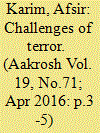

|
|
|
| 4 |
ID:
099895
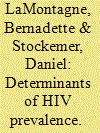

|
|
|
|
|
| Publication |
2010.
|
| Summary/Abstract |
Slightly over 25 years since the identification of the virus, Human Immunodeficiency Virus/Acquired Immune Deficiency Syndrome (HIV/AIDS) epidemic has killed millions of people and has expanded to become one of the greatest dangers in the world, threatening individuals, economies, communities and states. To better understand the factors underlying the wide discrepancies in HIV rates across countries, and to better prioritize interventions in the global fight against HIV/AIDS, it is imperative to build sound models that help to identify determinants of worldwide HIV prevalence. While scholars of various disciplines such as political science, anthropology and health studies have engaged in this endeavor, these studies have found divergent results. Seeking to construct a viable model, this current study examines nine theory-informed variables - income inequality, regime type, gender equality, GDP per capita (PPP), control of corruption, per cent Muslims in a country, education, contraceptive use and availability of antiretroviral medication that potentially affect a state's HIV prevalence. This research finds that conditions favorable to a decrease in HIV are low income inequality, a high per cent of Muslims in a country's population and high contraceptive use.
|
|
|
|
|
|
|
|
|
|
|
|
|
|
|
|
| 5 |
ID:
102693
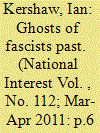

|
|
|
|
|
| Publication |
2011.
|
| Summary/Abstract |
A PROMINENT British government minister, Baroness Warsi, herself a Muslim, claimed just recently that Islamophobia has "passed the dinner-table test" in Britain and is seen by many as normal and uncontroversial. She warned of growing intolerance, prejudice and bigotry toward the Muslim faith and its adherents. In reply, some religious and social commentators have suggested that growing numbers of Muslims in Britain give rise to legitimate concerns. They have asked whether strict adherence to the Islamic faith is compatible with the values of Western democracies.
|
|
|
|
|
|
|
|
|
|
|
|
|
|
|
|
| 6 |
ID:
154427
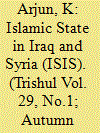

|
|
|
| 7 |
ID:
146757
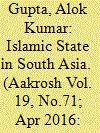

|
|
|
| 8 |
ID:
155000
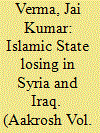

|
|
|
| 9 |
ID:
024123
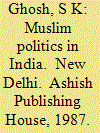

|
|
|
|
|
| Publication |
New Delhi, Asian Publishing House, 1987.
|
| Description |
xiv, 158p.hbk
|
| Standard Number |
8170240700
|
|
|
|
|
|
|
|
|
|
|
|
Copies: C:1/I:0,R:0,Q:0
Circulation
| Accession# | Call# | Current Location | Status | Policy | Location |
| 027493 | 322.10954/GHO 027493 | Main | On Shelf | General | |
|
|
|
|
| 10 |
ID:
116432
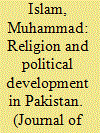

|
|
|
| 11 |
ID:
113535


|
|
|
|
|
| Publication |
2012.
|
| Summary/Abstract |
This article analyzes the main features of radical Islam in Spain and the role that Islamist radicalism plays in the radicalization of a significant minority of the Muslim population in Spain. It also examines the implications of the expansion of radical Islam on radicalization toward violence among segments of Spain's Muslim communities and on dynamics of social cohesion more broadly. The article argues that certain aspects of radical Islam strongly propel radicalization toward terrorism constituting early indicators of violent radicalization. The individuals on whom this ideology resonates and impact in a profound way are acutely vulnerable to violent radicalization.
|
|
|
|
|
|
|
|
|
|
|
|
|
|
|
|
| 12 |
ID:
118455
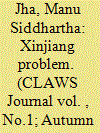

|
|
|
|
|
|
|
|